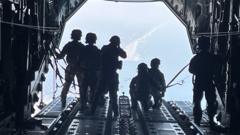13 minutes ago
About sharing
It is all over in seconds. The aircraft slows, lifts its nose and 12, perfectly wrapped pallets of humanitarian assistance slide off the open ramp at the back.
One minute ago, 10 tonnes of food and water was there, the next it was floating gently by parachute in the southwesterly breeze, touching down on the northern shores of Gaza.
This was the largest coalition airdrop of the war: 14 aircraft from nine nations delivering 10 tonnes of aid. The scale of the delivery was timed to mark the end of Ramadan.
At a military airbase to the east of Amman, the capital of Jordan, we watched as aircrew from the UK, the US, the Netherlands, Germany, Egypt, Indonesia, UAE and France were briefed by their Jordanian counterparts. They need to know who is doing what and where, the airspace over Gaza is small.
Each country has its own drop zone, its own way of delivering aid. The whole operation is organised by the Jordanians but everything has to be signed off by the Israelis. If the IDF says no, then the planes do not take off.
The Turks were planning to join the coalition today but were vetoed at the last minute.
The aid is stacked in vast open hangars: piles of flour, sugar, rice, beans, pulses, oil, and water. The UK has its own corner where British servicemen and women – both from the RAF and the 47 Air Dispatch squadron of the Royal Logistics Corps – carefully pack their own pallets.
Everything is carefully weighed – each bundle cannot be too light or too heavy. Everything is packed deliberately to avoid damage on impact. Ropes and straps are measured precisely into place. Few gifts have been so carefully wrapped. The whole thing sits atop a thick slab of plywood.
Fork-lift trucks load the pallets on to A400M, one of the RAF’s biggest transport planes – the successor to the much-missed Hercules C130s. Each container slides along a rolling track on the deck of the plane. Repeated checks are made to ensure they will not jam.
We take off and 40 minutes later we are over the drop zone. And here is the next complication.
The RAF normally drops aid as low as 400ft, but the Israelis have stipulated they must do so no lower than 2,000ft. That means the parachutes have a long time to get blown off course by the wind. That is why some airdrops in recent weeks have landed in the sea.
On our flight the pilots warned us they would drop the containers over the sea, but the southwesterly breeze would drift them back inshore. Which is exactly what happens. Job done and we return home.
So none of this easy. The potential for error is huge. It is also not a very good way of delivering aid.
The RAF flight was carrying about 10 tonnes of aid. That is less than a single truck can carry across a border on the ground. So there is huge effort and expense, but marginal impact.
The British military know this. But squadron leader Lucy Playle, the detachment commander in Amman, said the cumulative impact was beginning to tell, with around 1,500 tonnes of aid delivered in the past month.
“This is a sustained effort,” she said. “We’ve been here for three weeks now, and we are continually delivering aid.
“The people of Gaza are very grateful for the efforts that we are going to. And we will keep delivering and delivering, until we can’t give them any more.”
Some international aid charities say these flights are for show – to present an illusion that some countries are contributing to the humanitarian effort. They say the airdrops are a symbol of the failure to get aid in by other means, a distraction from that effort. They argue, correctly, that the airdrops will simply not meet the need on the ground.
There are also risks.
There is no way of organising the distribution on the ground. Some Gazans have been crushed stampeding for the pallets. Others have drowned trying to grab those landing in the sea. Some were even injured when containers dropped on buildings.
But the aircrews here in Jordan insist they are making a difference, that they are filling a gap – not least while there is simply not enough aid getting through by road or sea.
Warrant Officer Adrian Dibbs said: “It’s not that much – but it is the effort that counts, as in every little helps. I am quite proud and privileged to be involved in this sort of a mission.”
6 days ago
